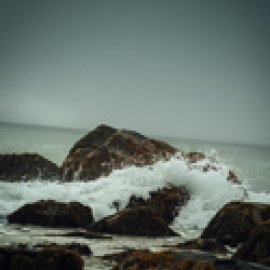RESCUE, part 13: The Democratization of Technology
-
English
-
ListenPause
[intro music]
Welcome to World Ocean Radio…
I’m Peter Neill, Director of the World Ocean Observatory.
Technology is a compendium of utilities, useful inventions intended for the betterment of our lives, profitable for all. Broadband is an example. Despite attempts to privatize internet access for fees, broadband asserts the potential of the internet system and enables the world to unite through communication, connection, the best for good, that accrues to our universal quality of life. Government, presumably, can be an agent of such democratization, through programs and relationships that apply technologies toward such public good: access to water, or public health systems, or education for all.
Here are three additional examples. First, is the concept of a universal grid, the system for distribution of energy, regardless of its source, across natural, political, and social boundaries. We pursue multiple alternatives to fossil fuel energy generation but whatever the source, the outcome is only as good as the distribution available to deliver the energy where and when it is needed, most efficiently, most economically, and most environmentally-sustainable. The condition of the national grid in the United States is an embarrassment of weaknesses, outages, and obsolescence. Its inadequacy represents a national emergency: the under-built, under-maintained condition of the national system guarantees need beyond availability, with only burn-out in-between. The condition demands the kind of massive, coordinated national investment comparable to the construction of the interstate highway system, the backbone of national transportation. In the 1950s, this massive investment was justified as essential for our “national defense.” I would argue that grid reconstruction today is not less and must be justified and financed beyond existing infrastructure appropriation to meet what is clearly an existential challenge.
Moreover, there is in this design the second exemplary requirement. We must incorporate the technology of the grid as a battery itself, as a nationwide storage system de facto, building into its reconstruction localized, industrial scale batteries to store excess power from new alternative generational flow, adjacent and integrated into the engineering required to meet a national emergency. One really cannot exist without the other.
There is another emerging approach that speaks directly to our ocean interests here: a saltwater flow battery that uses loops of salt and fresh water to induce an ion exchange to translate resultant energy into thermal storage, a unit that is cheaper, safer, not so environmentally destructive, that can be located to assist desalinization and other necessary components of our future needs. Given the radical decrease in global freshwater supply, again desalinization is the inevitable utility that must be met first, even before our cars, our profligate lighting, our non-essential manufacturing, our entertainments, and, even, our broadband, as lesser in priority than the freshwater required to meet the essential needs of our bodies, our families, our communities, and our nation-states. Here again, the inter-locking value, fresh to salt, that we argue for so often on World Ocean Radio, must be foreseen if the crisis, upon us today, can be met by tomorrow.
Finally, there is a third, also interconnected technology: the scientific exploration of the natural biome and the human genome, systems of Nature, on land and sea. When we destroy a forest, we destroy some of that potential. When we destroy a coral reef, we destroy more. When we poison ourselves, we destroy our ability to transcend the conventional knowledge and engineering response of our past, and destroy the remaining potential of the natural world that mutually sustains us. By our waste of energy and time, and by the outfall and degradation of past consumption – the PCBs and PFAs and POPs, the plastic, metal, and other detritus, the compromised inventory of terrestrial and marine species on which our human sustenance must rely – we discard invention, deplete these essential resources, and fail to use our new technology to design and provide a path to the future.
There is synergistic linkage in these examples, to be realized in their design: innovation and efficiency in sequence, from generation to distribution, from distribution to storage, from storage to integrated utility, from integrated utility to necessary scale, and from necessary scale to redemptive behavior by us, one for all. This is the democratization of technology and science that matters as a prescient strategy for RESCUE: R for Renewal; E for Environment; S for Society; C for collaboration; U for understanding; and E for Engagement.
We will discuss these issues, and more, in future editions of World Ocean Radio
[outro music]
This week we continue the multi-part RESCUE series with defined programs and relationships that apply technologies toward public good, such as a universal grid system, battery generation and storage, desalination, and better understanding of natural systems and our relationship to them. RESCUE as an acronym offers a plan for specific action and public participation: Renewal, Environment, Society, Collaboration, Understanding, and Engagement.
About World Ocean Radio
5-minute weekly insights dive into ocean science, advocacy and education hosted by Peter Neill, lifelong ocean advocate and maritime expert. Episodes offer perspectives on global ocean issues and viable solutions, and celebrate exemplary projects. Available for syndicated use at no cost by college and community radio stations worldwide.
Image
Photo by Tim Foster on Unsplash
@timberfoster
- Login to post comments



